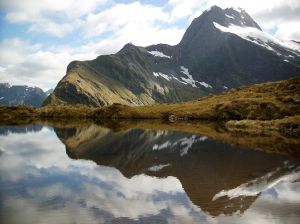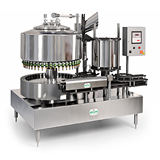Associate Professor Earl Bardsley from Earth and Ocean Sciences says unlike traditional mining operations, "water mining" through cloud seeding is a sustainable process that has no evident impact on the environment other than enhanced water yield.
"The scientific basis of cloud seeding is well established and a number of techniques are available," says Dr Bardsley.
"A well-known approach is to add small amounts of silver iodide crystals into high cloud tops where liquid cloud droplets exist at temperatures less than 0ºC. This triggers off a freezing reaction and frozen particles clump together to form snowflakes which fall under gravity and either melt to form raindrops or accumulate as enhanced snowfall in mountain regions."
Dr Bardsley concedes that the variance in rain and snowfall means there's no consistency of yield, but he says portions of Tasmania have been cloud seeding for nearly 50 years to increase hydro output and figures suggested that rainfall in seeded catchments is about 5% up on unseeded catchments.
"Tasmania has similarities to New Zealand's South Island with westerly winds creating high rainfall in the western ranges and lower rainfall in the eastern lowlands.
"This suggests the possibility of enhancing Canterbury water supply by increasing winter snowfalls through seeding Norwest clouds as they pass over the Southern Alps. The melting snows in spring and summer would then increase the river flows for irrigation and power generation."
Prof Bardsley says there’d also be a need for some storage dam construction to gain maximum benefit of the new water and hold it back for use. In Tasmania it was estimated that in 2007 cloud seeding operations generated an extra $3.5 million dollars of income for an operational cost of $1.3 million.
"But in the rugged Southern Alps it will be difficult to measure snow pack to determine any enhancement through cloud seeding. So I think the best approach here would be hydrological rather than meteorological," says Dr Bardsley.
"That is, we would measure the river flow coming from a seeded region and see whether on average the discharge increased relative to river flows from a control unseeded region. But if proven effective, cloud seeding has the potential to increase the economic development of Canterbury, where increased water demands are causing stress on limited water supplies."
Dr Bardsley says there is no reason for concern about decreased winter rainfall in Canterbury as a result of successful Southern Alps cloud seeding. Another issue might be the possibility of silver iodide accumulation in national parks.
"But the amounts involved are so small that any amounts present in our pristine environments would most likely be below detection levels."



-160x160-state_article-rel-cat.png)








-160x160-state_article-rel-cat.png)



